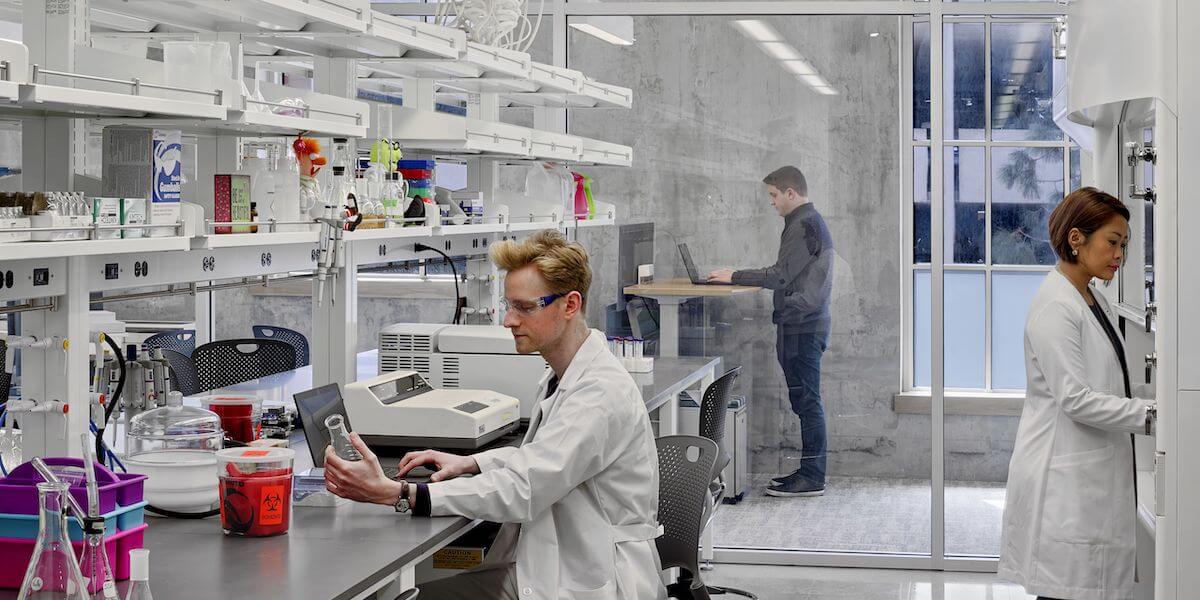
New Mann Engineering in Medicine Pilot Grants program will build ongoing research collaborations between USC Viterbi School of Engineering and Keck School of Medicine of USC.
The lifesaving medical discoveries and therapeutics of the future will be one step closer, thanks to a University of Southern California pilot grant initiative that aims to strengthen the pipeline between cutting-edge biomedical engineering research and clinical applications.
The first project announcements for the Mann Engineering in Medicine Pilot Grant Program will support new research collaborations between investigators at USC Viterbi School of Engineering and Keck School of Medicine of USC. The initial funding supports a range of exciting research collaborations, from improving outcomes for patients with aggressive blood cancers to a brain imaging technique to combat involuntary patient movement.
The $100,000 pilot grants are possible thanks to the historic $35 million naming gift that in 2022 established the Alfred E. Mann Department of Biomedical Engineering.
Dwight C. and Hildagarde E. Baum Chair in Biomedical Engineering Peter Yingxiao Wang said that the grants aimed to enhance the department’s research collaborations by forging ongoing research partnerships across the two schools, with each successful project addressing a significant research or clinical application by harnessing novel engineering approaches.
“The program will enable the formation of interdisciplinary teams that leverage engineering tools to produce novel insights or breakthrough technologies, facilitating significant advances in health,” Wang said.
“Since taking on the role of Department Chair, it has been a key priority to promote closer and more systematic collaboration between USC Viterbi and Keck School of Medicine, so that we can make a difference for patients. This pilot grant program would not have been possible without the unwavering support from both Deans Carolyn Meltzer and Yannis Yortsos,” Wang said.
While the current collaborations will focus on USC Viterbi and Keck School, Wang said that future funding rounds could also support the expansion of collaborations across other health-related schools.
The initial projects funded under the program are as follows.
A real-time volumetric imaging system for the liver
According to the American Liver Foundation, more than 100 million people in the United States have some form of liver disease. If left untreated, these can lead to liver failure and liver cancer. Clinicians currently rely on ultrasound imaging to assess liver health and function, with contrast-enhanced ultrasound (CEUS) a common detection and characterization method for focal liver lesions. However, because these studies are 2D, accurately quantifying and analyzing the whole lesion is difficult and incomplete. The real-time 3D characterization could help long-term monitoring and also assess the effects of treatment.
A collaborative team from the Alfred E. Mann Department and Keck School will work on a broadband, real-time, volumetric imaging system capable of improved anatomic and functional imaging for the liver and other abdominal organs. The project will be led by Jesse Tong-Pin Yen, an associate professor of biomedical engineering, and co-PI Vinay Duddalwar, professor of clinical radiology, urology and biomedical engineering at Keck School of Medicine.
Correcting motion artifacts and noise after brain imaging data acquisition
A significant challenge in human brain imaging is correcting “motion-induced artifacts” — the noise or errors caused by voluntary or involuntary head movements during scans. It is a particular issue in infants and children, as well as patients with movement disorders, and can lead to misdiagnosis or misinterpretation.
New research will harness machine learning to combat this problem via a Motion-Adaptive Diffusion Model (MADM), a generative deep learning approach that provides a highly trainable probabilistic framework that can learn more realistic and diverse patterns of human motion-induced artifacts. The framework would allow clinicians to retrospectively convert “unusable” data into reliable information to aid diagnosis and improve patient outcomes. The work will be led by Dean’s Professor of Biomedical Engineering Michael Khoo, and co-PI Ho Sung Kim an assistant professor of neurology at Keck School.
Better prediction of drug responses for patients with aggressive blood cancers
Acute myeloid leukemia (AML) is a rare and aggressive cancer of the bone marrow and the blood. Standard treatment for patients is intensive chemotherapy, which often leads to drug resistance and relapse, as well as a high mortality rate in older patients. Challenges remain for newer targeted and combination cellular therapies due to complex genetic mutations and differing patient responses.
New research aims to meet the urgent need for new biomarkers and assays to better predict therapeutic responses in AML patients. The team will look into the metabolic behavior of cells to develop a comprehensive library of metabolic optical biomarkers (MOBs) using fluorescence lifetime imaging microscopy (FLIM) while also creating a drug treatment assay to predict drug responses. The work is led by Keyue Shen, an associate professor of biomedical engineering at USC Viterbi, and Yali Dou, the Marion and Harry Keiper Professor of Cancer Research at Keck School.
